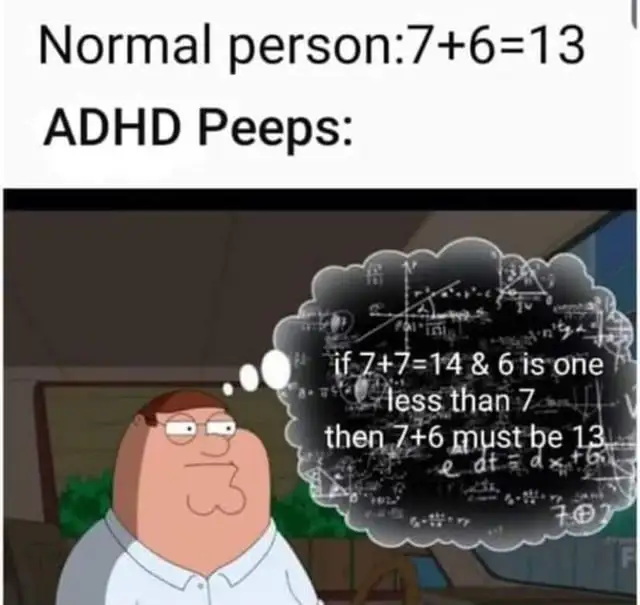uhhhh that's not how everyone does it?
ADHD memes
ADHD Memes
The lighter side of ADHD
Rules
Other ND communities
- ADHD - Generic discussion
- Ausome Memes
- Autism
- AuDHD
- Neurodivergence
7+6
You need 3 to get to 10. 3 left over. 10+3=13.
I'd split up the 6 into (3,3) in my head
Same thing as 7+3+3
This has nothing to do with ADHD... mixing up stuff is just confusing people
I try not to be all "that's not ADHD that's just normal" here but yeah this one has nothing to do with ADHD.
A Therapist told me that there is a lot of nonsense on the web, especially in the AuDHD space, and yeah it tends to go in a "you are a scorpio, you do X" way
One of the worst parts of the latest ADHD wave
And I try not to be all “I’m not ADHD and I do this” on this com, but it’s true.
This has absolutely nothing to do with ADHD
I have no attention span and this is not how I do math.
I'm sorry, but this is a silly statement. This is by no means an ADHD thing. It's a pattern understanding or logic
I'm trying to teach my kid this. Not to use this specific method for addition, but recognize and understand patterns in math.
What most people misunderstand about mental illness diagnoses is that most people have most of these symptoms. It's only when these symptoms overlap and disrupt your ability to *healthily function as an individual that they require a diagnosis and medication/therapy.
Edit: Added healthily as that's the real distinction.
That's the smart way to do math. I mean not with such small numbers but you'd do the same thing adding up large numbers, you break down the numbers and rearrange them in a way that's easier to compute.
Algebra probably feels intuitive to you.
They're also trying to teach that in math classes (it gets called "new" math) but the boomers are freaking out because "why can't they just do normal additions like we used to, this is so complicated". And the answer to that is, 99% of the time you'll be doing algebra because we literally all carry a calculator in our pockets and sometimes on our wrists at all times and we never need to just do a long division. And that kind of thinking really makes it easy to break down formulas because your brain thinks in terms of moving stuff around in an equation.
I think the reason "new math" gets flack, is because it's a new way of teaching math, and alot of teachers aren't as good at teaching in that way yet. Still, kids should be taught that it can be a way one does calculations. Another thing I think should be incorporated into early childhood education is the use of an abacus, the Japanese do this and it supposedly helps greatly with mental math.
They're also trying to teach that in math classes (it gets called "new" math) but the boomers are freaking out because "why can't they just do normal additions like we used to, this is so complicated".
So, as a childless Xennial, I have to ask... is today's "new math" the same "new math" that people complained about in the 60s?
If so, that's an awfully long time for something to be shunned as "new."
we never need to just do a long division.
Truth. I recently got a neuropsych evaluation and part of it was an unexpected (to me) IQ test. And staring me in the face, for the first time in ~30 years, was a few pages of arithmetic problems. Took me a minute to recall how to do decimal multiplication but it did come back to me. Long division? Nope. Had no freaking clue. Given that it was timed I just left blank anything I couldn't work out in my head. Maybe if I had time for trial and error I could have eventually figured it out. But one thing is for sure... the odds of me ever needing that skill again are fairly low.
This. I went from 50s and 60s to high 90s in my last 2 years of high school math because we were getting taught wave functions and real science math finally and all you need to know there is how to figure out which formula to use and which numbers to plug in. I'm terrible at basic arithmetic but crush algebra and later got good at food math by necessity. Also just finding ways to not count as much helped. Like when doing catering we would store plates in basically giant poker chip sets on wheels. People used to stack em in randomly until I finally figured out the closest multiple of 10 you could get to in a stack before going over the top. It was 70 plates and each dolly or whatever had 4 slots for stacks, so if all was in place each was 280 which made getting the plates ready for events way quicker cause people didn't have to manually count them, just use your 7 times table and then count the remainder to add or subtract. Once I figured out that you don't necessarily NEED the math you learn in school but if you remember to use it, it can really fucking speed things up. Also all math should be represented as algebra from the start, instead of 2+2= and leaving a blank space phase it as 2+2=x and solve for x. I think more complex algebra wouldn't scare kids as much if they knew they were kinda doing it all along.
This is how it is supposed to be taught. Common core has this exact quality of numbers explicitly shield or in primary school curriculum. Numbers are not static objects but the composite of infinite functions that can be used to determine the value in whatever base number system you want. Next time someone says school didn't teach math remind them that the US is something like 30th in the world at math and when the department of education tried to do something about it parents said it was too hard to understand and we just kept falling backwards.
Source : I have a BA and masters in math with a focus on education
I agree that this is how it should be taught. I wasn't taught it until high school. And even then it was by a university student who came to our physics class to talk to us about the kinds of things we could expect in university. :p
I'm in Canada btw.
No, since 6+6=12, then because 7 is one more than 6, 6+7=13
7 + how much is ten? 3
How much is left? 3
Ten plus however much is left = 13
wait, no, this is how everyone does math. right? ...right?
I think so, but I'm so deep on the autism spectrum that I'm probably SCUBA-certified, so...

7 is closer to 10 than 6 so we consider that 7 is really just a 10 with a size-3 hole in it and we fill that hole with 3 from the 6 giving a 10 with 3 left over which make 13.
Also not an ADHD thing.
That's my strat too. Also confused what this has to do with adhd
6=3+3, 7+3=10, 10+3=13
PS I had to edit this post because of typos.
That's how our math teacher taught us to take shortcuts in elementary school.
i was gonna say, this is ADHD math? I just thought this was mental math in short lmao.
That's just called using heuristics, friend, though if ADHD impeded their progress in math, maybe ADHD people rely more on heuristics than neurotypicals do.
Yeah this is just math.
7+6=? 7+3+3=? 10+3=? 13=13 (Not ADHD)
Interesting, I make sets of 10. When I see 7 and 6, half of the 6 moves over to make 10 + 3. I say "moves over" because it feels like dividing tokens into sets in my head.
Elementary school had us using tokens for math constantly and it made it way harder for me. Especially cause 'showing our work' meant basically drawing the lil tokens on paper that were either black or white I think black represented a minus and white represented a plus (on paper, they were red and yellow irl). So I ended out doing the equation different and then reverse engineering the method they wanted from me.
I calculate percentage like this. If 100% is the value, then I know what 10% is, then1%, so I do increments of both until I get to the correct value.
It may sound stupid,but it does help me get a % fast enough.
The meme has nothing to to with ADHD, however your explication of how it happened does.
I don't think I have ADHD but I do it exactly this way.
I definitely don't have ADHD and I do it exactly this way
My brain actually computes it first as 7 + 5 = 12 + 1 = 13.
I add 5s together a lot at my work (14, 19, 24... 63, 68, 73....) hard to explain why, but my brain jumps to 5s very easily for addition because of it.
Same! I don't have ADHD, but I do 7 + 3 = 10, then 10 + 3 = 13
For some reason, 7 and 6 aren't addable to me.
Wait, let me check the math...
6+6=12 and 7 is one more than 6, so 6+7=13
Cool. Checks out.
I always tell my children that Maths is finding the best way to cheat at a problem. Don't solve the hard problem. Solve the easy one that's kind of like the hard problem and then find the difference.
And judging by the school material that's how they're supposed to do it. But either the teachers aren't explaining it that way or the kids aren't listening.
Prostrate yourselves, defective prole masses. I’ve memorized my +/- tables all the way up to 8.
How I calculate percentages and settle for close enough.
get to 10, add what's left.
6-3=3, 7+3=10, 10+3=13
This is a good approach, but for this example I break it up as:
7+6=7+3+3=10+3=13
Holy shit balls I feel seen!
